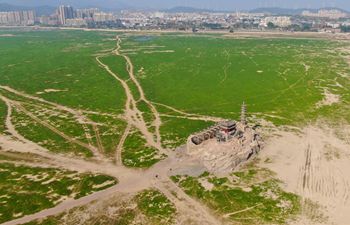by Zeynep Cermen
ISTANBUL, Oct. 10 (Xinhua) -- The Chinese arrivals in Turkey increased by 40 percent during China's week-long National Day holiday that started on Oct. 1, reported representatives of Turkish travel agencies.
According to Serdar Ibis, a co-founder of Dorak Tour, Chinese visitors flocked in large numbers to their favorite destinations in Turkey during the past days.
"We can easily say that the number of our Chinese guests visiting our country increased by 40 percent alone last week," he told Xinhua.
During the past week, 70 percent of the foreign tourists who visited Cappadocia, a popular tourist destination in the central province of Nevsehir, were Chinese nationals, said Irfan Karsli, head of the Ligarba Tourism travel agency.
For Karsli, the figure indicates "a significant year-on-year increase for the region," which is renowned for its impressive landscape featuring changing colors of a unique rock formation in the sunlight.
"Hot-air balloon tours and hotels have been fully booked by Chinese tourists for almost two to three weeks," he told Xinhua.
Both Ibis and Karsli have seen a growing diversification of Chinese tourists over the last couple of years.
"Previously, only elderly Chinese tourists came to Turkey," Ibis explained. "Now more and more middle-aged and young Chinese people are preferring to spend their holidays in Turkey."
The spending tendencies of the Chinese visitors are also changing, according to Ibis.
"For example, young people enjoy spending money on extreme activities," he said, referring to paragliding flights over the Dead Sea in the Mediterranean resort town of Fethiye, and hiking and safari tours in Cappadocia and other locations.
In Karsli's view, young Chinese tourists know exactly what they want, where to go, what to eat and what to see in Turkey.
"They get all the necessary information about the country, including prices, products, popular destinations and restaurants long before coming to Turkey," he noted.
In addition to Cappadocia and Turkey's biggest city of Istanbul, the central Anatolian province of Konya, Pamukkale or Cotton Castle in the southwestern province of Denizli, and the Ephesus archeological site in the western province of Izmir are also among the Chinese favorites.
Safranbolu in the Karabuk province in the Black Sea region and the Neolithic site Gobekli Tepe in the southeastern province of Sanliurfa are becoming increasingly popular as well with Chinese travelers in all age groups, according to Ibis and Karsli.
In response, Ligarba is now considering organizing tableland tours in the Black Sea region for the Chinese tourists for the first time.
"The nature of the entire region is beautiful and we are sure that Chinese people will enjoy the Black Sea in terms of discovering its unique culture, nature and local tastes," said Karsli.
Speaking about the changing interests of the Chinese tourists, Karsli listed real-estate tours on top of their plans.
"For the last six to seven months, there has been a notable trend in the number of Chinese tourists who came to Turkey to buy real estate, which in return forced several agencies to launch specific tours for that purpose," he said.
The Chinese mostly prefer to buy apartments or shops in Istanbul, while others buy summer cottages in the Aegean and Mediterranean regions, noted Karsli.
For Chinese tourists with a strong spending power, "shopping continues at full speed and is increasing day by day," while others "are in the pursuit of cheap prices and do not spend the amount we want," said Karsli.
Generally the Chinese show interest in leather goods, specially-designed stone jewelry, porcelain plates decorated with traditional Turkish motifs and meerschaum pipes, according to the Ligarba head.
The number of Chinese tourists hit 292,322 during the first eight months of this year, marking an increase of 12.66 percent year on year, show figures released by the Turkish Ministry of Culture and Tourism.
For Karsli and Ibis, the insufficient number of flights between China and Turkey is a big challenge for both sides.
"The airline companies are currently flying with full capacity but still the demand is too much," Ibis said.
"If we had more flights during China's national holiday period, we would have brought more Chinese tourists to Turkey," added Karsli.

















